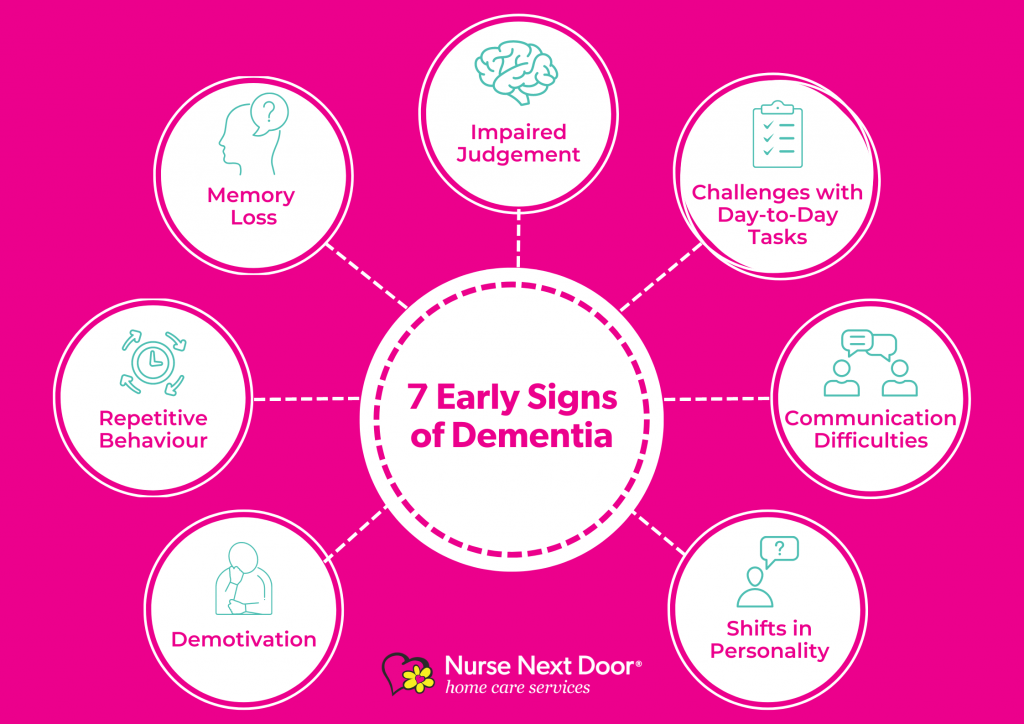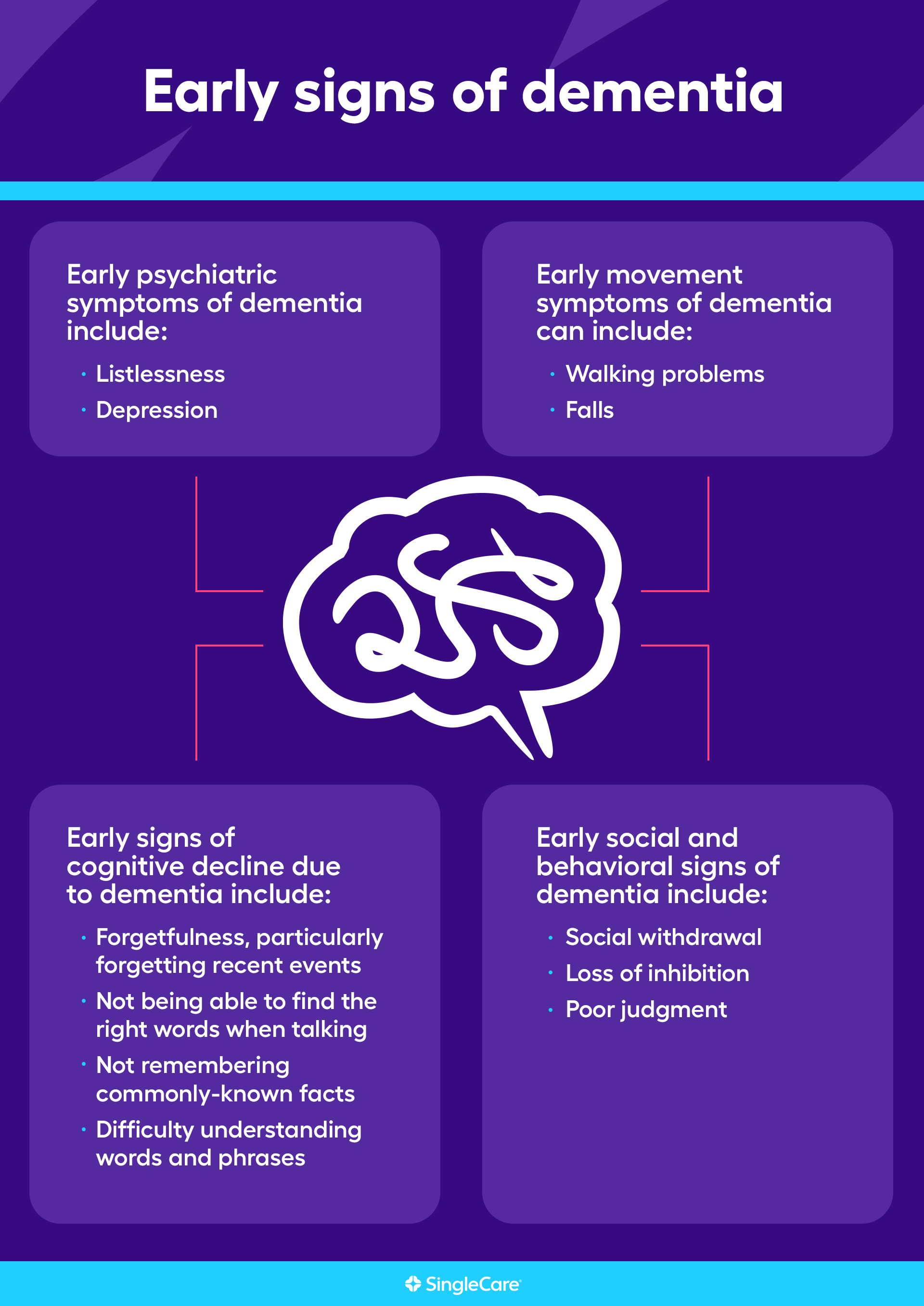7 Early Signs You May Be Facing Early Onset Dementia
7 Early Signs You May Be Facing Early Onset Dementia
Blog Article
Comprehending the Effect of Dementia on Every Day Life and Caregiving
Dementia influences day-to-day live in extensive means, affecting not just those identified yet additionally their caregivers. As cognitive decline advances, you may observe modifications in interaction and routine that difficulty both parties. Recognizing these changes is essential for maintaining self-respect and involvement. But just how do you adjust your caregiving techniques to support a person traversing this complex journey? The solutions could shock you as we discover the subtleties of this experience.
The Phases of Mental Deterioration and Their Results on Every Day Life
As you browse the trip of mental deterioration, recognizing its phases can substantially impact exactly how you take care of day-to-day life. Mental deterioration commonly progresses through 3 major stages: early, center, and late.
During the middle stage, you'll experience more noticeable cognitive decline. Daily jobs could end up being tough, and preserving your self-reliance might need changes. Using pointers and simplifying your setting can aid.
In the late phase, individuals typically require considerable assistance with daily activities. Planning for treatment comes to be crucial, focusing on comfort and top quality of life. By recognizing these phases, you're better equipped to react proactively, ensuring you or your enjoyed one can browse the challenges with dignity and elegance.

Adjustments in Interaction and Social Communication
Exactly how do modifications in communication influence your daily interactions as mental deterioration advances? As dementia advancements, you could observe that easy conversations come to be tough. Words might escape you, or you may battle to find the best phrases. This can bring about disappointment for both you and your liked ones. Nonverbal cues, like gestures or faces, come to be increasingly vital.
You may locate it simpler to link with these means as opposed to depending entirely on spoken language. Paying attention abilities can also alter; you may find it tougher to follow conversations or bear in mind what was just stated (Frontotemporal Dementia). This can bring about misconceptions or feelings of isolation
Motivating perseverance and producing an encouraging environment can help. Participating in activities that promote link, like music or art, can boost social communications. Bear in mind, keeping relationships is still possible; it's almost adapting to new methods of connecting.
Influence On Daily Routines and Activities
While steering daily regimens, you'll likely observe that tasks you as soon as completed easily come to be much more difficult as dementia progresses. Basic tasks like cooking, dressing, or perhaps showering might call for more effort and time. You may locate on your own forgetting action in acquainted regimens or struggling to remember where you put items. This can result in disappointment not just for you, however likewise for those around you.
Adapting your environment can assist; for circumstances, identifying products or making use of lists can simplify jobs. Involving in recurring, structured activities can likewise offer comfort and a feeling of achievement. Keep in mind, it's fine to ask for help.
Psychological and Behavior Difficulties
Steering with daily routines can cause not just practical challenges, yet likewise psychological and behavioral ones. You could discover changes in state of mind, such as boosted anxiousness or frustration, which can originate from confusion or difficulty in completing jobs. As you browse these moments, it is important to acknowledge that your loved one might share their feelings with habits like frustration or withdrawal.
These emotional responses can be unforeseeable and might emerge without caution, leaving you both feeling overwhelmed. You might find that acquainted settings or routines can help reduce anxiousness, yet maintaining perseverance becomes considerable. It is essential to confirm their sensations, even if you do not completely understand them.
The Function of Caregivers in Sustaining Individuals With Dementia
As a caregiver, you play a necessary role in supplying psychological assistance for people with dementia. Establishing daily treatment regimens can develop a sense of security and convenience, helping to ease their anxiousness. By recognizing their requirements and utilizing efficient methods, you can considerably boost their lifestyle.
Psychological Support Methods
When caring for a person with mental deterioration, comprehending the emotional landscape is important for offering effective assistance. Easy gestures, like holding their hand or preserving eye call, can develop a sense of security. Eventually, do not forget to take care of your very own psychological requirements; seeking assistance for yourself can boost your ability to care for them.
Daily Care Routines
Establishing day-to-day care regimens is essential for use this link supplying stability and comfort to people with mental deterioration, as these routines can help decrease confusion and stress and anxiety. You can start by describing a constant routine for dishes, tasks, and rest. This predictability helps your loved one really feel extra secure and engaged.
Integrate familiar tasks, like folding laundry or watering plants, which can stimulate positive memories and foster a feeling of accomplishment. Use visual hints, such as schedules or lists, to assist them with the day.
Be flexible, though; adapt routines as needed based upon their mood or power degrees. Vascular Dementia. Keep in mind, your patience and understanding are crucial in maneuvering their changing requirements, guaranteeing they feel supported and valued throughout their day-to-day live
Creating a Safe and Comfy Living Environment
Developing a secure and comfy living setting is essential for people with dementia. You'll intend to make home security modifications that reduce dangers and ensure experience to give a sense of convenience. By focusing on these elements, you can assist produce a space that supports both safety and security and health.
Home Safety Modifications
As you navigate the difficulties of mental deterioration, making home security modifications can greatly enhance comfort and protection. Begin by getting rid of tripping dangers like rugs and mess, guaranteeing pathways are clear. Mount grab bars in shower rooms and non-slip floor coverings in the shower to avoid falls. Take into consideration utilizing brighter illumination and evening lights to boost presence, especially throughout nighttime. Tag essential areas, such as the shower room and cooking area, with clear indications to aid with alignment. Protect any sharp objects or poisonous substances unreachable. Furthermore, examine your home's locks and alarm systems to confirm they're user-friendly and offer comfort. These adjustments not just promote security yet likewise urge self-reliance, allowing your enjoyed one to feel more at simplicity in their setting.
Convenience and Familiarity
After ensuring a risk-free atmosphere with needed alterations, fostering convenience and familiarity is essential for people with dementia. Start by individualizing their space. Usage acquainted colors, designs, and photographs that stimulate pleased memories. A preferred blanket or chair can supply a sense of safety. Keep a consistent routine to aid them feel grounded and decrease anxiety. Easy, acquainted meals can likewise create a reassuring ambience. Maintain pathways clear and clutter-free to stay clear of complication. Incorporate soft illumination, as intense lights can be disorienting. Take into see this consideration including relaxing fragrances, like lavender, to advertise leisure. Taking part in acquainted tasks, such as paying attention to music or gardening, can improve their sense of belonging, making their living environment a real refuge.
Techniques for Effective Caregiving and Support
While navigating the difficulties of dementia care can feel frustrating, carrying out effective techniques can considerably improve both the caretaker's and the individual's daily experience. Beginning by developing a routine; predictability helps decrease anxiousness for both you and your loved one. Use clear, basic interaction-- brief sentences and straight questions can prevent confusion.

Do not forget to care for yourself; schedule breaks and get in touch with assistance teams. Sharing experiences with others in similar situations can offer important understandings and emotional relief.
Finally, stay patient and versatile. Mental deterioration can bring unpredictable modifications, so adapting your approach is necessary. By utilizing these strategies, you can you can find out more foster a much more favorable environment that profits both you and your liked one.
Often Asked Concerns

What Are the Different Kinds Of Mental Deterioration?
You'll find numerous kinds of dementia, consisting of Alzheimer's, vascular mental deterioration, Lewy body dementia, and frontotemporal dementia. Each kind influences memory and cognitive function differently, so understanding the distinctions is essential for appropriate diagnosis and treatment.
Just How Can I Assist A Person With Early-Stage Dementia?
You can aid somebody with early-stage dementia by being person, using support, and urging them to participate in tasks they take pleasure in. Keeping routines consistent and preserving open communication can likewise make a substantial difference in their every day life.
Exist Financial Resources Available for Dementia Treatment?
Yes, there are funds readily available for mental deterioration treatment. You can discover government help programs, not-for-profit organizations, and insurance coverage alternatives. It's additionally smart to speak with local companies for details sources tailored to your situation.
What Legal Factors To Consider Should Caregivers Understand?
As a caregiver, you must take into consideration power of lawyer, medical care proxies, and guardianship regulations. It's important to understand the legal rights and obligations you hold, ensuring your loved one obtains ideal treatment and security.
How Can I Handle Caretaker Anxiety?
You can handle caregiver stress and anxiety by focusing on self-care, seeking support from teams or good friends, setting practical assumptions, taking breaks, and practicing leisure strategies. Keep in mind, your wellness matters just as high as the person you're caring for.
Recognizing the Impact of Mental Deterioration on Daily Life and Caregiving.
As you navigate the journey of mental deterioration, comprehending its stages can considerably influence exactly how you manage day-to-day life.While steering day-to-day routines, you'll likely see that tasks you as soon as completed easily become extra difficult as dementia proceeds.Establishing everyday care routines is vital for giving stability and convenience to people with dementia, as these routines can aid decrease complication and stress and anxiety.While steering the difficulties of dementia treatment can really feel overwhelming, carrying out effective techniques can significantly boost both the caregiver's and the patient's everyday experience.
Report this page